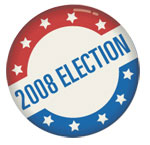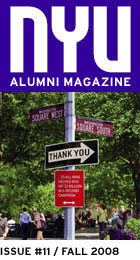political persuasion
The New Spin
Lobbyists now advocate for image along with issues
by Andrew Flynn
Smear has always been a potent tool in American political life. Remember how that “monarchist” John Adams was denied a second presidential term, and that “megalomaniac” Barry Goldwater was kept from even a first?So despite John McCain and Barack Obama’s talk of a new kind of politics, it’s no shock to see the return of character assassinations in the 2008 presidential campaign. However, the source of these attacks has changed. More than ever, political parties now share the job of polishing—and tarnishing—a candidate’s image with a vast and varied lobbying industry no longer corralled by advocating only policy issues. “Much of the rhetoric on television and in print is produced and paid for by interest groups,” explains Rogan Kersh, a scholar of lobbying and associate dean at the Robert F. Wagner Graduate School of Public Service. “The effect of this is huge—not in terms of policy positions but in the creation of highly negative images of the candidates.”
Ironically, this phenomenon has been spurred on by campaign finance reforms, which limited the amount of money lobbying groups could give directly to a party. This led to the meteoric rise of independent “527 groups”—made infamous in the 2004 election by the Swift Boat Veterans for Truth’s attack on John Kerry’s war record—which circumvent donation restrictions by advocating for a specific issue rather than a candidate.
And the candidates have taken advantage of 527s to make up for their particular campaign weaknesses. McCain has relied on these groups, Kersh says, because of his enormous fund–raising disadvantage; the less well–known Obama, who backed out of public financing for his campaign, has used them to broadcast his vision to a national audience.
Despite their new focus on shaping a candidate’s character, special interest groups still dictate what issues make their way to Washington, D.C. Kersh notes how the candidates have carefully danced around the question of fossil fuel consumption while professing to take part in the conversation: “No one says, ‘Let’s cut oil and coal’—there’s just general talk about global warming and conservation. That’s an enormous testament to the effect lobbying has.” And yet he cautions against a knee–jerk rejection to special interest groups: “Even as the average American is decrying lobbyists and interest groups, there are a whole set of these groups advocating for their interests. Our system is simply too big, with too many issues, for it to work without lobbyists. They are its lifeblood.”








